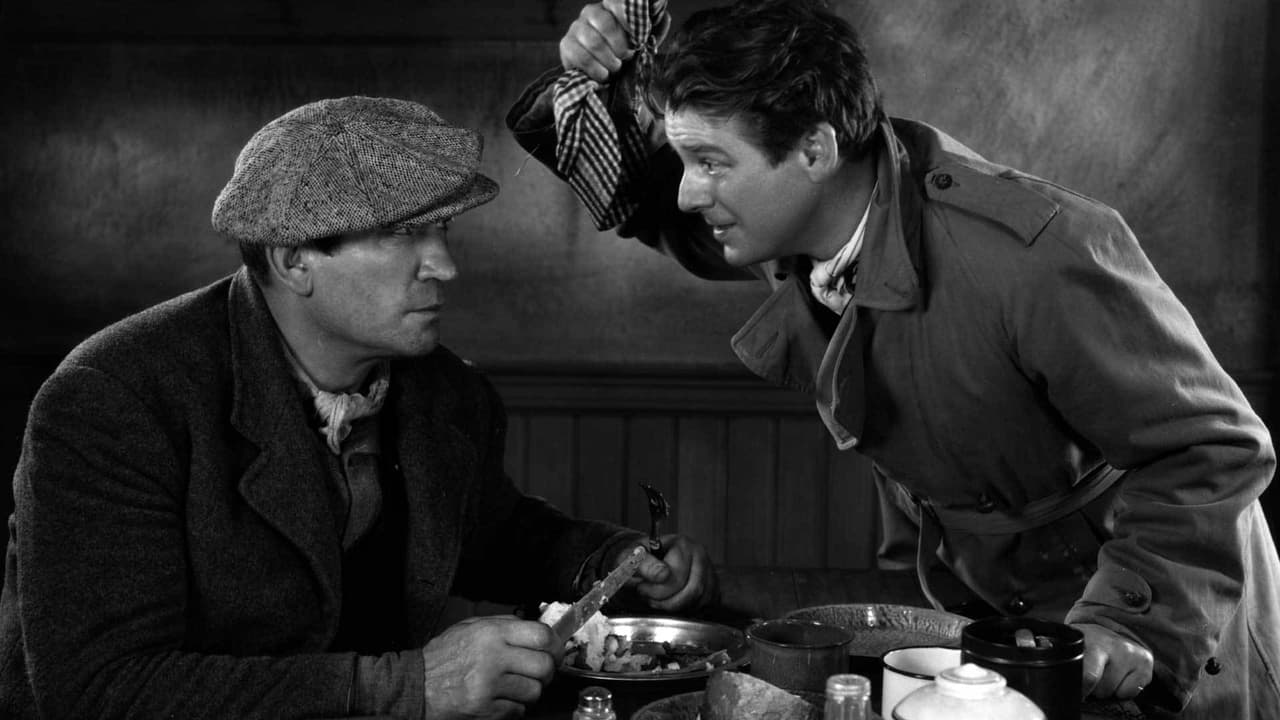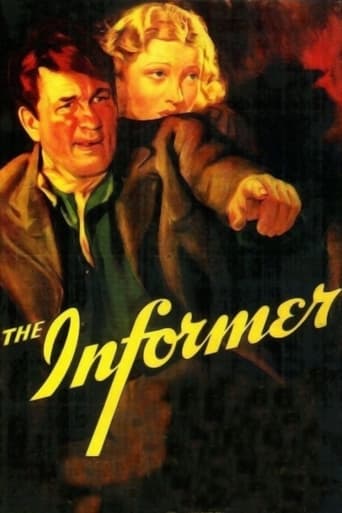

"The Informer" is like a film noir before film noir even existed.John Ford directed this arty film about an Irishman who rats out a friend for 20 pounds during the Irish troubles in the 1920s. It's a character study of a dumb lunkhead who wants to be a big man in the eyes of his compatriots but isn't a real man in any of the ways that actually matter. The film looks fantastic, full of fog and atmospheric shadows, and visually Ford keeps it endlessly fascinating.One wishes his skill as a director had extended to his actors as well. Victor McLaglen, who plays the informer, gives an obnoxious, one-note performance, one prolonged drunken shout. And Margot Grahame, as his girl and the one who he steals the money for, is overwrought. The film is still more than worth a watch, but its effectiveness is hampered by the performances in it. Only one performance, that of the ubiquitous Una O'Connor's as the mother of McLaglen's dead friend, stands out."The Informer" won four Academy Awards in 1935, the most wins for any film that year, including Best Director for Ford, Best Actor for McLaglen, Best Screenplay for Dudley Nichols and Best Scoring for Max Steiner. But it somehow managed to lose the Best Picture Oscar to "Mutiny on the Bounty," which, though the most nominated film of the year, was the third and final film to date to win Best Picture without winning any other awards. One of the stranger Oscar years.Grade: A-
... View MoreIn 1922 Ireland, burly and boozing Victor McLaglen (as Gypo Nolan) turns "Judas" against rebel leader Wallace Ford (as Frankie McPhillip). Consequently, his former comrade is shot dead by British police. After getting drunk with the reward money, Mr. McLaglen is haunted by his dirty deed. The betrayer becomes an emotional wreck. "The Informer" struck gold for McLaglen, who won an "Academy Award" for his title performance, edging out write-in candidate Paul Muni (for "Black Fury"); other "Oscar" voters split between three "Mutiny on the Bounty" co-stars, with Charles Laughton placing third in the ballots.Despite being overblown and melodramatic, "The Informer" must be placed high on a second tier of director John Ford's work. While a little too obvious and not entirely cohesive, this film was a significant advancement in his art. Ford reveals himself uncommonly, with a language and style in full formation. The film augmented this with "Best Film" honors from "The New York Times", "New York Film Critics" and "National Board of Review"; it was #2 in "Oscar" voting and #3 in "Film Daily" polling. Also receiving praise were photographer Joseph H. August, writer Dudley Nichols, and supporting actress Margot Grahame.******** The Informer (5/1/35) John Ford ~ Victor McLaglen, Margot Grahame, Preston Foster, Heather Angel
... View MoreDuring the Irish rebellion of the 1920s, a rebel turns in one of his friends for a reward. Once regarded as a towering achievement for Ford, winning him his first Oscar, it now stands as one of his most dated films, mainly due to the terrible overacting. McLaglen is the main offender here, playing his larger-than-life drunkard so over-the-top that it's painful to watch these days. Of course, the Academy awarded him an Oscar for it and he went on to play variations on this character in numerous other Ford films, mostly Westerns. The rest of the cast is equally bad. The film is visually impressive, but it's hard to look past the melodramatics.
... View MoreThe Informer is a lyrical and rather artsy reimagining of Liam O'Flaherty's grim novel of betrayal set during the Irish troubles of the 1920's. Co-producer and director John Ford, co- producer Cliff Reid and screenwriter Dudley Nichols pared down the original considerably and brought out what they saw as its essence – the struggle of one Gypo Nolan with his conscience, fought out not only within his own stunted brain but through interactions with various characters who were also simplified and sanitized, the better to direct our attention to the tormented title character. This modern-day Judas tale retains some of the power of the Biblical antecedent. A desperate former member of a revolutionary organization betrays a fugitive comrade to the police for what seems to him a grand sum of money. The comrade is killed; the informer is paid; the money is worthless the moment he acquires it. The realization of what he has done prompts him to drown his consciousness in liquor and get rid of the ill- gotten gain in whatever haphazard way he can. Representing the slummy underworld of Dublin are stage sets by Van Nest Polglase that suggest drabness, meanness and poverty in a movie studio way. The slum dwellers are presented as alternately rowdy and pious with little in between. Many of the characters in the original novel were so decayed and sordid that mainstream movie studios would not have been able to put them on screen intact. The politics of the organization which the title character betrays are kept nebulous and generic. In the novel it was actually a communist cell within the Irish national movement – but that might have given audiences too much to think about. The character of Dan Gallagher, chief of the local revolutionary group, who investigates whether Gypo is guilty, is played boringly and stiffly by Robert Preston. To be fair, the part is underwritten. Gallagher, a die-hard communist revolutionary who can't quite understand what makes himself tick, is just as complex as Nolan but from page to screen loses his human nature and is reduced to "the handsome romantic love interest" to the sister of the betrayed man. The subsidiary members of the organization are presented in the vein of Hollywood gangster's sidekicks, ciphers with interesting faces instead of full-blown, conflicted individuals whose lives and traits would hold our interest. There is plenty of action, all of it expertly choreographed, to breathe life into what might have otherwise been stagy and static, for there is a great deal of talk in the source material.The title character in the book was damaged goods, ravaged by hunger, bruised and beaten by cops, unwashed, unschooled. As embodied by Victor McLaglen he comes across more like a well-fed dock worker with bad manners. The scenarists try to make up for this whitewashing of the main character by showing him drinking whiskey as if it's Kool Aid and tossing annoying people around, in the manner of the Frankenstein monster, like rag dolls. Both tendencies are in the novel but here they are exaggerated. It is simply impossible to believe that someone could drink so much hard liquor in one night without becoming violently ill or passing out cold. True, he does fall asleep on his girlfriend's floor toward the end, but more in the way of a nap than the kind of blacked-out unconsciousness that should have occurred under the circumstances. As for Katie, the woman in Gypo's life, Margot Grahame is far too scrubbed and attractive for this setting. Her relationship with Gypo is changed from a crude interdependence based on brute survival needs to a more conventional Hollywood loving couple arrangement, which really makes no sense in the context of the narrative. Although prostitution is presented more frankly here than in most movies of the era, it still had to be gauzed over. As the slain fugitive's mother, Una O'Connor is on hand with her trademark howling – a waste of her talents.The Informer was considered very strong stuff back in 1935. It's more of a curiosity today.
... View More